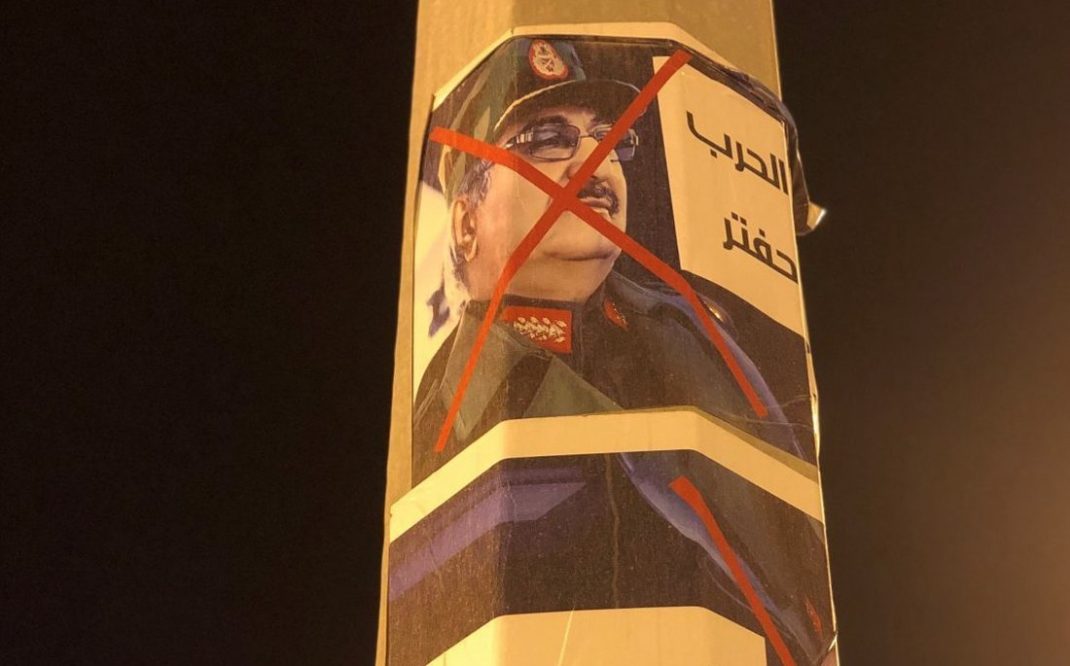By Sara Firth
 ‘We are injured.’ – Standing at a podium in Libya’s capital Tripoli one of the speakers from the assembled members of Libyan Civil Society took to the stage and entered into a ten-minute diatribe.
‘We are injured.’ – Standing at a podium in Libya’s capital Tripoli one of the speakers from the assembled members of Libyan Civil Society took to the stage and entered into a ten-minute diatribe.
TRT World was there and in the conference as part of a ‘fact-finding mission’ organized by the London-based think-tank International Center for Relations and Diplomacy (ICRD).
The aim of this particular meeting was for the Libyan journalists, lawyers, NGO’s to give an overview of the current situation in Libya to the foreign journalists and diplomats assembled.
Tripoli right now is once again experiencing some of the worst violence for the past 8 years.
The UN backed Government of National Accord (the GNA) and forces loyal to them are fighting a rebel push to take Tripoli by rebel commander Khalifa Haftar and his self-styled Libyan National Army.
So far, the GNA forces and militias loyal to the Government, have managed to hold them off.
But more frequently the fighting on the frontline on Tripoli’s doorstep has seen an overspill into civilian areas.
At the beginning of July an airstrike hit one of Libya’s controversial and illegal detention centers in a Tripoli suburb killing at least 50 people and wounding more than 130, including women and children.
The UN recognized Government in Libya blames rebel commander Khalifa Haftar and his forces for the strike.
It was a damning indictment of the UN backed GNA’s policy of detaining migrants and refugees in appalling conditions, that have been well documented.
It’s a condemnation too of the European policy of sending those migrants trying to flee Libya by sea of sending those people back to what’s increasingly looking like a country at civil war.
The risk to the most vulnerable civilians in Tripoli is immense.
On a visit to a children’s IDP camp in the suburbs, you could hear the sound of artillery fire, the frontline just 5-10km away.
Back in the conference room in Tripoli the criticisms of the international community reponse goes further.
‘The UN empowered and supported Haftar’ one speaker yells into the microphone. ‘They brought Haftar to Libya and the UN should leave Libya’. There will be no peace while Haftar is present. He is a traitor.’
Haftar’s forces are far from their stronghold in the East.
One frontline fighter supporting the GNA told TRT World, laughing, ‘Haftar’s forces are tiring. They don’t even have a place to shower.’
At a briefing with senior UN staff the reality of the battle for Tripoli was laid bare.
There’s roughly 1000 fighters from both sides fighting over 100km of territory.
They are now fighting over small patches of territory, taking and retaking farms and villages.
A small frontline with the potential to cause major damage.
Fuelling the armed groups belief that they can break this stalemate is the fact that both sides are being armed by various countries in contravention of an arms embargo.
Whilst the war on Tripoli’s doorstep right now has been described by the UN as a ‘military stalemate’, there’s a serious caveat to that.
Speaking to the UN Libya Ghassan Salamé he provided a stark warning. If one of the sides suddenly gain a military advantage by being supplied with more advanced weaponry, that could be a game changer.
Concerning then, that in the past few weeks once the GNA retook a Haftar stronghold of Gharyan in the South of Tripoli, Libyan Government fighters discovered a cache of powerful American missiles (although it’s suspected they were sold to another country before ending up in Haftar’s hands) including four Javelin anti-tank missiles. The missiles are capable of destroying battle tanks.
Walking around Tripoli’s Martyrs Square and the only signs of the war nearby are the anti-Haftar posters and banners decrying the UN’s ‘Demolishing Mission in Libya’.
But around 15km away from the coffee drinkers in the capitals’ cafes and the children feeding the birds, the stagnant frontline could pose more of a threat than the capital’s relative calm belies.
Outwardly EU countries like France are still publicly backing the UN-recognized Government, at the same time they are supplying Haftar’s forces. They’re not the only ones.
At the end of the conference in Tripoli the mood is tense and combative.
The foreign journalists gathered take umbrage at the ear-bashing they just received on behalf of their collective countries.
But the words of the speaker who ends the conference sit heavy.
‘If our words are harsh it’s because we Libyans feel betrayed. We are injured.’
Should this fight in Libya escalate further, the war at the door of Tripoli will cause a lot more injury yet.
I was only on the ground in Tripoli for a day and a half and on a Government run tour.
When we dodged our minders and spoke to Libyan’s in Tripoli there were among some we spoke to clear (but quiet) support for Haftar, but no one we spoke to wanted war to return to the capital.
Just a day and a half in Tripoli, but you didn’t need months on the ground to see the frustrated anger amongst a population that were promised ‘democracy’ for their country that right now couldn’t be further from it.
***
Sara Firth is TRT World’s Middle East Correspondent.
________
EUROPEAN INTEREST




